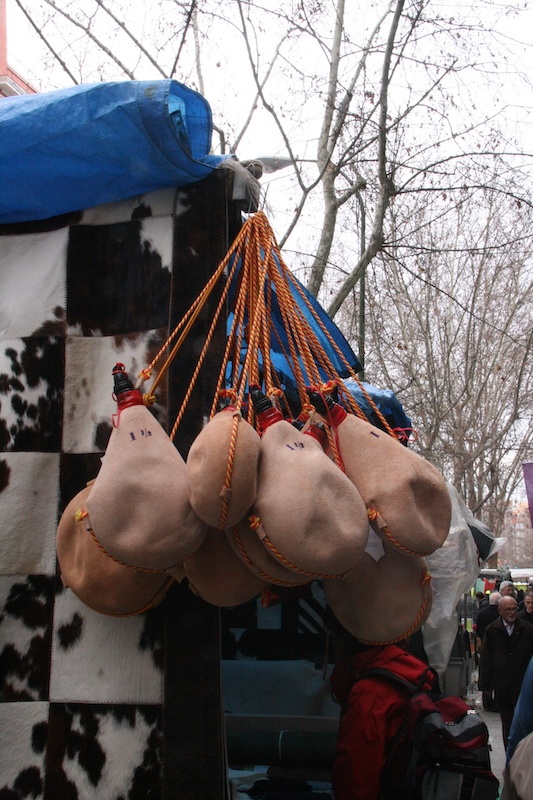Daily Office Readings for Friday, January 15, 2021: AM Psalm 16, 17;
PM Psalm 22; Isa. 42:(1-9)10-17; Eph. 3:1-13; Mark 2:13-22
I’m sure many of us have read, heard, or discussed the whole proverbial business of putting new wine in old wineskins and sewing new patches of cloth on old holes. (I’ve always been amused, though, that we tend to focus more on the wineskins than the cloth–perhaps because wine is more attractive than sewing!) This pandemic, hard as it has been in so many ways, has revealed something we tended not to think about before the pandemic–the Church has never stopped fermenting.
Around a year ago we were thrust into the challenge of how to maintain community when a virus put a stopper on the wineskin of our church building. A lot of things in our shared community lives that we took for granted were no longer options. We had to learn how to ferment in new wineskins, but weren’t even sure what made a suitable wineskin.
Yet, here we are, very much in the middle of this experience, and if we truly have embraced the challenge, and not simply walked away from it, we’ve seen interesting and encouraging pockets of fermentation. We discovered that some people in our parishes had skills that weren’t needed in the wineskin of the pre-pandemic parish, but were suddenly miracle working in the way they presently shape our worship. Who would have known that fooling around with GarageBand and iMovie had value in church? It has energized some of the younger members of our parishes to the point they feel they do have a role in the ordinary bits of parish life. It has created stronger intergenerational relationships. (Who of us over 50 hasn’t had to ask a 20-something or a teenager how to do something on Zoom, YouTube, or Facebook live?) Some of us have had the joyful experience of having our bishop confirm or receive people who found us online, possibly not even having set foot in our church buildings until the day the Bishop laid hands on them. Yes, the pandemic has been hard–some days unbearably hard–yet, we are recognizing the sweet smell of fermenting wine in interesting and unusual places.
We are far enough into this pandemic to begin to dream about what the post-pandemic church might look like–this new wine–and what might compose the new wineskins–in the same way many of us engage in the age old dance of “January and seed catalogs.” I’ve always said one of the blessings of January in rural northeast Missouri is the arrival of seed catalogs in the mail as the earliest heralds of spring. January is a month where one of the happiest things I do is turn the pages of seed catalogs and dream of what my garden might look like in the summer. Nothing relieves the depression of breaking ice and shoveling snow like a full color photo of a beefsteak tomato, and imagining its rich, sunshine-impregnated flavor hitting my taste buds and dribbling down my chin, or a beautiful purple and white iris winking at me and reminding me my own irises are only three or four months away.
The temptation, of course, as we start to open cellar doors and peek out at the post-pandemic world, will be to pour this fermenting wine back into the old wineskin and return to the comforting feelings of “church the way we always knew it”. To be fair, many have suffered from the absence of the old model. We miss the sensory experience of live church, we long for the kinesthetic input of the communion rail and the human touch that accompanies it. Our numbers post-pandemic will most likely be smaller–yet we will have growing, new expressions of our faith and the depth of it which will need room to grow. The new wineskin will need to be broad enough to accommodate new growth.
Perhaps it’s time to start looking at seed catalogs. I’m sure there are many out there, but I recently finished a book from our own Church Publishing Company that, for me, certainly provided that old familiar feeling of looking at the seed catalog, and I’d like to commend it to you for your personal reading and for adult formation groups. It’s an easy read–a little over a hundred pages–yet a thought-provoking one. If you have time, check out the book “We Shall Be Changed: Questions for the Post-Pandemic Church”.
God has never stopped the fermentation; however, this might be the first time we were in a position to notice it. What dreams should we include in the new wineskins?
Maria Evans splits her week between being a pathologist and laboratory director in Kirksville, MO, and gratefully serving in the Episcopal Diocese of Missouri , as the Interim Pastor at Christ Episcopal Church, Rolla, MO.

